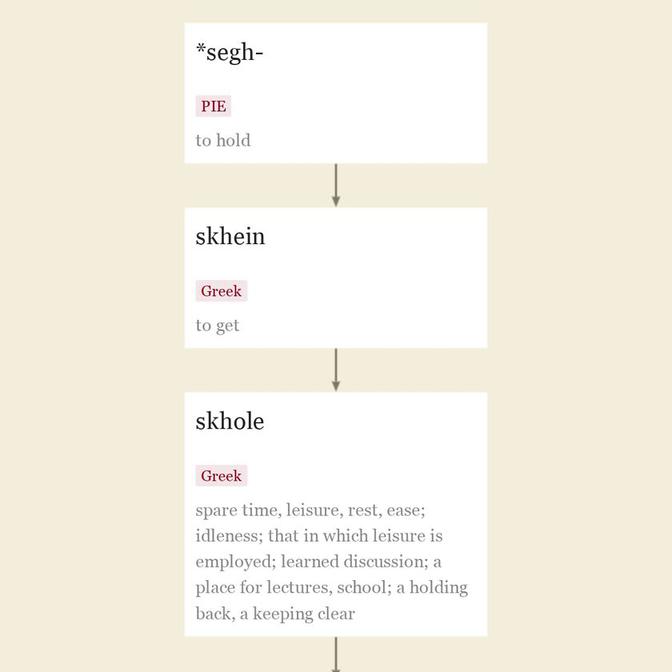public school (n.)
1570s, originally, in Britain, "a grammar school endowed for the benefit of the public," but most have evolved into boarding-schools for the well-to-do. From public (adj.) + school (n.1). The main modern meaning in U.S., "school (usually free) provided at public expense and run by local authorities," is attested from 1640s.
Entries linking to public school
late 14c., publike, "open to general observation," from Old French public (c. 1300) and directly from Latin publicus "of the people; of the state; done for the state," also "common, general, of or belonging to the people at large; ordinary, vulgar," and as a noun, "a commonwealth; public property." This Latin word was altered (probably by influence of Latin pubes "adult population, adult;" see pubis) from Old Latin poplicus "pertaining to the people," from populus "people" (see people (n.)).
Attested in English from early 15c. as "of or pertaining to the people at large" and from late 15c. as "pertaining to public affairs." The meaning "open to all in the community, to be shared or participated in by people at large" is from 1540s in English. An Old English adjective in this sense was folclic. The sense of "done or made by or on behalf of the community as a whole" is by 1550s; that of "regarding or directed to the interests of the community at large, patriotic" is from c. 1600.
Public relations "the management of the relationship between a company or corporation and the general public" is recorded by 1913 (with an isolated use by Thomas Jefferson in 1807). Public office "position held by a public official" is from 1821; public service is from 1570s; public interest "the common well-being" is from 1670s. Public enemy, one considered a nuisance to the general community, is attested from 1756. Public sector attested from 1949. Public funds (1713) are the funded debts of a government.
Public woman "prostitute" is by 1580s, on the notion of "open for the use of all." For public house, see pub.
[place of instruction] Middle English scole, from Old English scol, "institution for instruction," from Latin schola "meeting place for teachers and students, place of instruction;" also "learned conversation, debate; lecture; disciples of a teacher, body of followers, sect," also in the older Greek sense of "intermission of work, leisure for learning."
This is from Greek skholē "spare time, leisure, rest, ease; idleness; that in which leisure is employed; learned discussion;" also "a place for lectures, school;" originally "a holding back, a keeping clear," from skhein "to get" (from PIE root *segh- "to hold") + -olē by analogy with bolē "a throw," stolē "outfit," etc.
The basic sense of the Greek word is "leisure," which passed to "otiose discussion" (in Athens or Rome, the favorite or proper use of free time), then it came to be used for the place for such discussion.
The Latin word was widely borrowed (in addition to Old French escole, French école, Spanish escuela, Italian scuola; Old High German scuola, German Schule, Swedish skola, Gaelic sgiol, Welsh ysgol, Russian shkola).
The meaning "students attending a school" in English is attested from c. 1300; the sense of "school building" is by 1590s. Sense of "people united by a general similarity of principles and methods" is from 1610s; hence school of thought (by 1848). As an adjective by mid-18c., "pertaining to or relating to a school or to education."
School of hard knocks "rough experience in life" is by 1870; to tell tales out of school "betray damaging secrets" is from 1540s. School-bus is from 1908. School days is from 1590s. School board "local committee of education" is by 1836; school district "division of a town or city for the management of schools" is by 1809.
Trends of public school
More to Explore
updated on January 22, 2021
Dictionary entries near public school
pubescence
pubescent
pubic
pubis
public
public school
publican
publication
publicise
publicist
publicity

